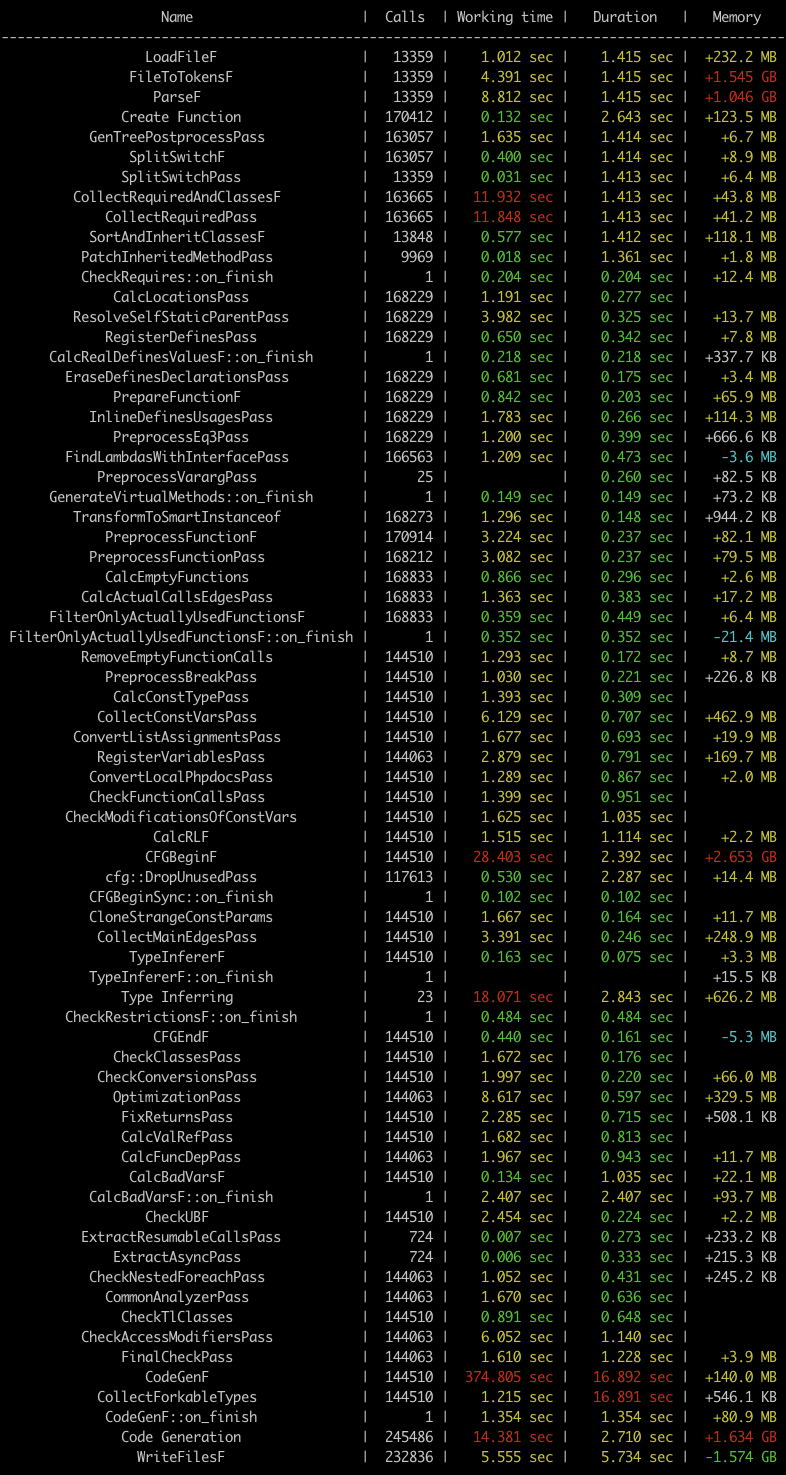KPHP internals — stage 1: compiler
The Compiler KPHP stage translates PHP sources to C++ sources.
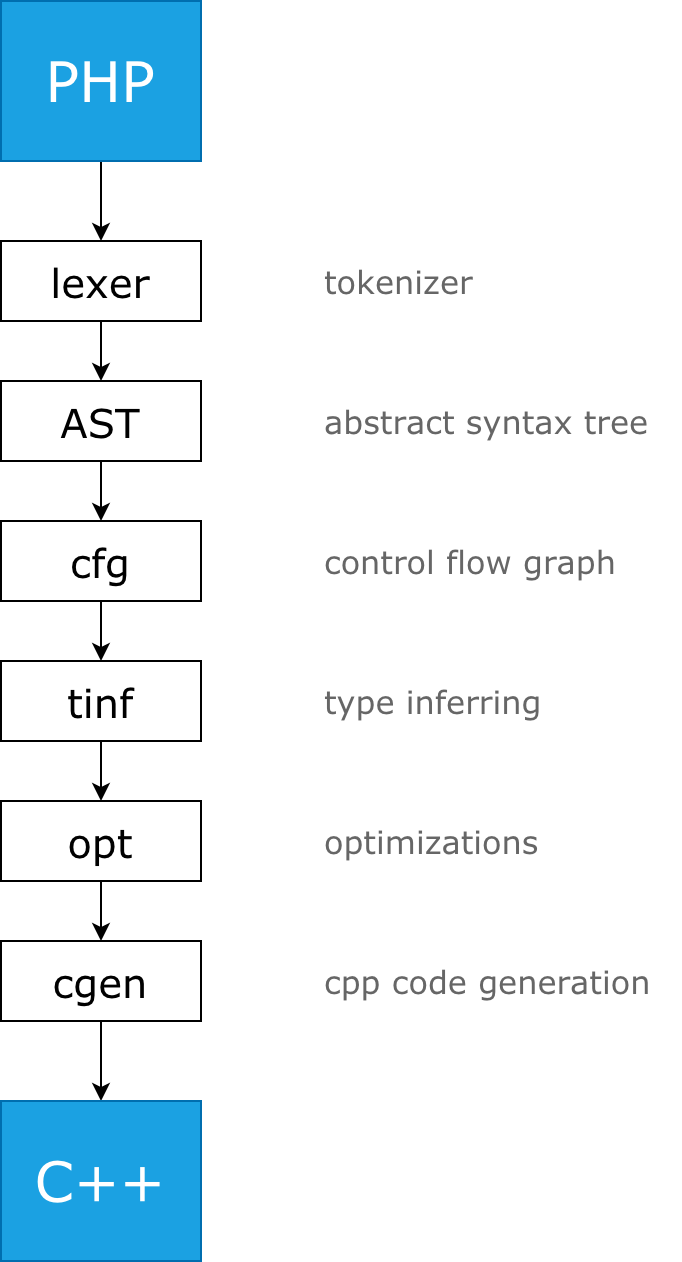
It is supposed, that you know such words as AST, tokenizer, and other parsing-related terminology.
Overview: functions, classes, files
The compiler's top-level object is a function. Even file content is expressed as a “file wrapper” function, even a class declaration is a special “class holder” function.
KPHP stores the AST tree for every function. Let's see, how this code structure is expressed at the top-level:
// ------------ main.php
require_once 'lib.php';
function main() { /* ... */ }
global $id;
$id = detectCurrentId();
main();
// ------------ lib.php
class InputParser {
static function parseCookies() { /* ... */ }
}
function detectCurrectId() {
return InputParser::parseCookies()['id'] ?? 0;
}
This code will emit 6 functions:
- “file wrapper” for main.php, contains global code (requires lib.php, assigns $id, calls main())
- main() function
- “file wrapper” for lib.php, with empty AST (since lib.php has no code in global scope)
- “class holder” for InputParser, with empty AST
- InputParser::parseCookies() function
- detectCurrectId() function
It doesn't matter, where main() function is declared: as given, or before require_once, or after the global keyword. Unlike PHP, which dynamically emits symbols while parsing, KPHP analyzes the whole code.
“Empty AST” is just a tree with one single node named “op_empty”.
All declared and implicitly created classes are stored in a map, but each of them has a corresponding “class holder” carrier function, which travels throughout the whole pipeline, like a regular function.
Overview: compilation pipeline
If you take a look at compiler.cpp, you'll see such code:
SchedulerConstructor{scheduler}
>> PipeC<LoadFileF>{}
>> PipeC<FileToTokensF>{}
>> PipeC<ParseF>{}
>> PassC<GenTreePostprocessPass>{}
/* ... */;
It represents the pipeline of compilation. It's quite handy and readable: load files, then tokenize, then parse, then do some postprocessing, etc.
All compilation process is described in this pipeline.
Every “pipe” takes an input, transforms it somehow, and pushes to the output stream.
The compiler runs in multi-threaded mode (KPHP_THREADS_COUNT env variable), so this pipeline is parallelized: if there are N functions, it's undetermined, which would be handled the first at each step. At the exact moment, different functions are processed at different pipeline steps. Nevertheless, there are “points of synchronization”. All pipes are implemented to be as independent as maximum to require less synchronization and global state modification, and all global storages are thread-safe or lock-free.
There are 3 kinds of pipes:
- PipeC. It takes any input and produces any output. For example, FileToTokensF takes file contents and tokenizes it, so (see file-to-tokens.h) its input is
SrcFilePtr, and output isstd::pair<SrcFilePtr, std::vector<Token>>. - PassC. It takes a function and returns this function, processing all AST vertices.
- SyncC. It's a synchronization point: the output is omitted all at once only when all inputs are processed.
Pipeline starts from “main files” enumerated as kphp arguments: kphp ...options main-file.php.
Pipeline finishes with writing .cpp/.h files. Afterward, gcc is launched.
Overview: reachability and classes autoloading
A PHP project contains lots of code, which should not be compiled: development tools, unit tests, etc. Moreover, some production parts of the project may remain PHP-based.
KPHP starts from “main files” and
- adds a file to the pipeline if require or similar occurs
- adds a file to the pipeline if classes are referenced (according to autoload rules)
- adds a function to the pipeline only if it is explicitly called
This means:
- if a file is never required from reachable code, it won't be parsed
- if a class is never referenced from reachable code, it won't be parsed
- if a function is never called, it would be lexically parsed, but won't be analyzed later on
It's quite a common situation, that you start writing code, and this code is incorrect — for example, type requirements are not satisfied. But KPHP compilation succeeds — just because this code is never invoked. Once it becomes reachable, you'll see all related compilation errors.
This topic is deeply described here: What PHP code exactly would be compiled?
For classes autoload rules, check the same article.
This logic is contained inside CollectRequiredAndClassesF pipe. It's an intricate pipe because it has multiple outputs to make file loading parallelized with class resolving and inheritance binding when subhierarchy is already loaded.
Lexer (tokenizer)
The first step of loading PHP files is transforming a string file contents to a vector of tokens.
Here and later, we'll use this short snippet:
$a = [1];
$a[] = \A::TWO;
The tokenization process will produce this order of tokens:
$a tok_var_name "a"
= tok_eq1
[ tok_opbrk
1 tok_int_const "1"
] tok_clbrk
; tok_semicolon
$a tok_var_name "a"
[ tok_opbrk
] tok_clbrk
= tok_eq1
\A tok_func_name "\A"
:: tok_double_colon
TWO tok_func_name "TWO"
; tok_semicolon
tok_empty
Some patterns are post-processed, for instance, \A::TWO will be unified to a single tok_func_name.
Lexing and grammar is self-written, it doesn't involve bison or similar solutions.
Tokens are described in keywords.gperf and lexer.cpp. PHPDoc is also parsed using a tokenizer.
AST and vertices
The abstract syntax tree is a priority-dependent representation of any statement/expression. All possible language constructs can be described using AST.
$a = [1];
$a[] = \A::TWO;
After tokenization, we get the following AST:
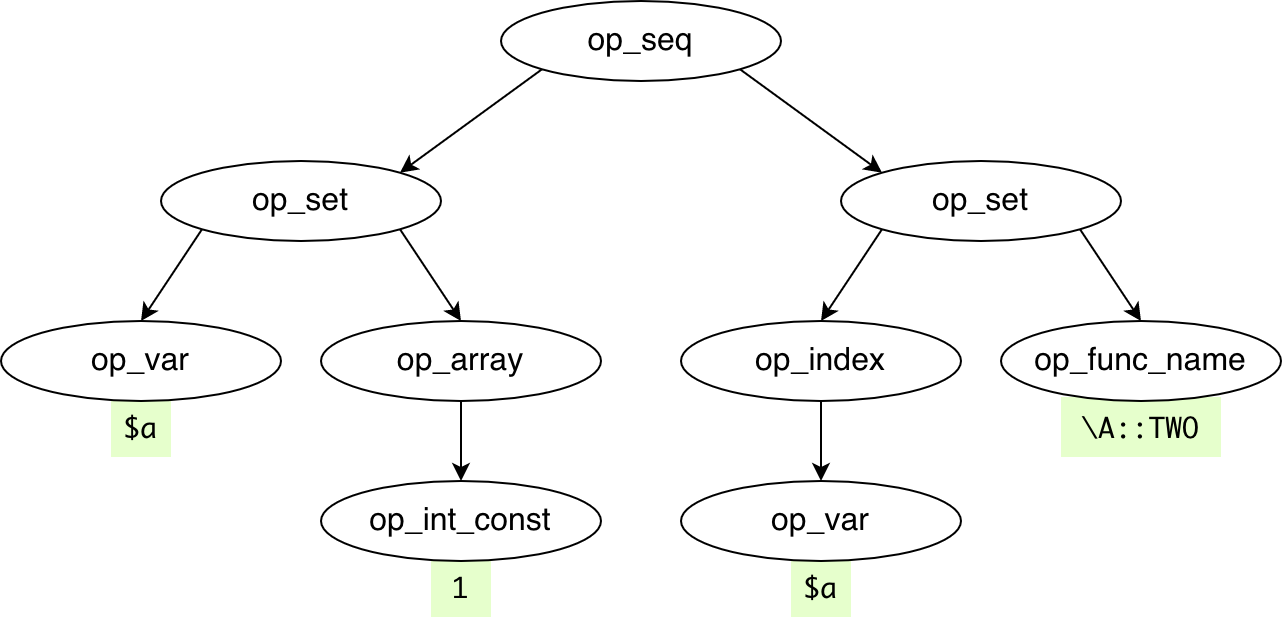
AST nodes are called vertices. Each has a type “op_…”, optional data depending on the type, and optional children.
All available vertices are listed in vertex-desc.json. This JSON is used for codegeneration. After compiling KPHP from sources, the objs/generated/auto/ directory will contain CPP sources for all vertices types: vertex-op_try.h, etc.
All vertices are C++ template specializations and inherit vertex_inner<meta_op_base>. Its internal implementation is a bit tricky, particularly in negative memory offsets for children. This is done for fewer memory allocations because parsing large PHP projects creates hundreds of millions of vertices, so optimization is necessary here.
Pipes are AST transformations
The first version of AST from tokens is generated with gentree.cpp.
Later on, this AST is modified several times, functions can be generated and cloned.
As mentioned earlier, PassC pipes traverse all AST vertices of all functions. Each pipe is focused on finding concrete patterns and modifying AST.
For example, InlineDefinesUsagesPass searches for constants/defines usages. It replaces \A::TWO with 2:
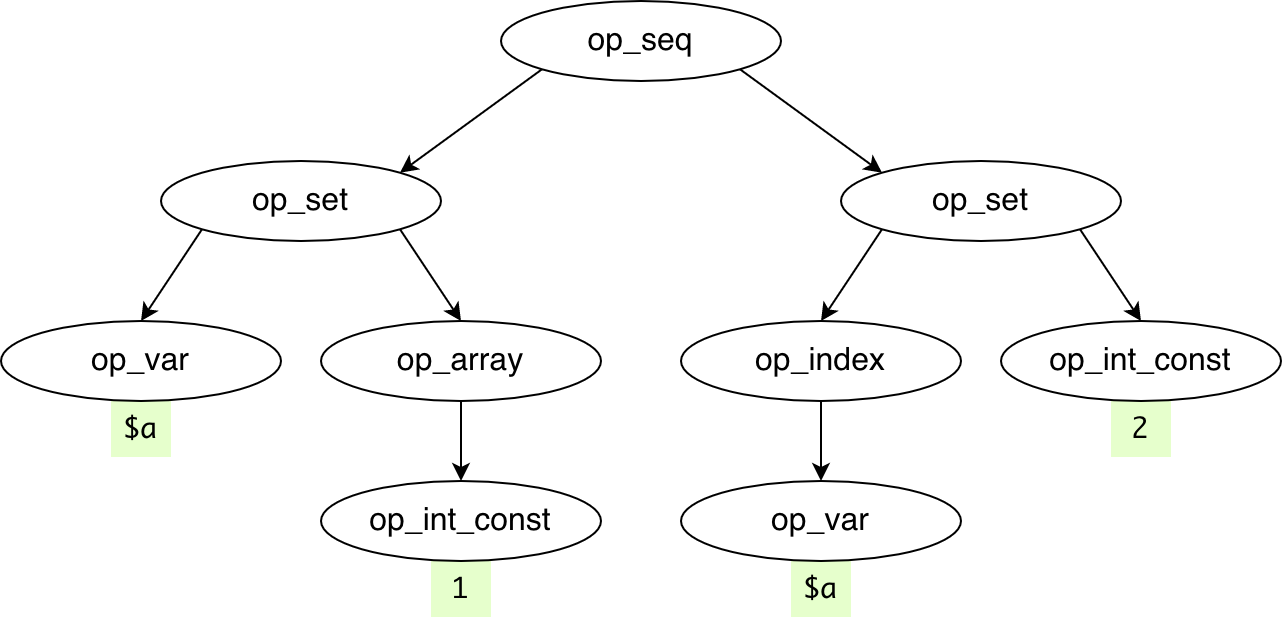
Another example. Constant arrays and strings are extracted separately so that they could be created only once at master process initialization and avoid creation at runtime. CollectConstVarsPass replaces [1] with const ref:
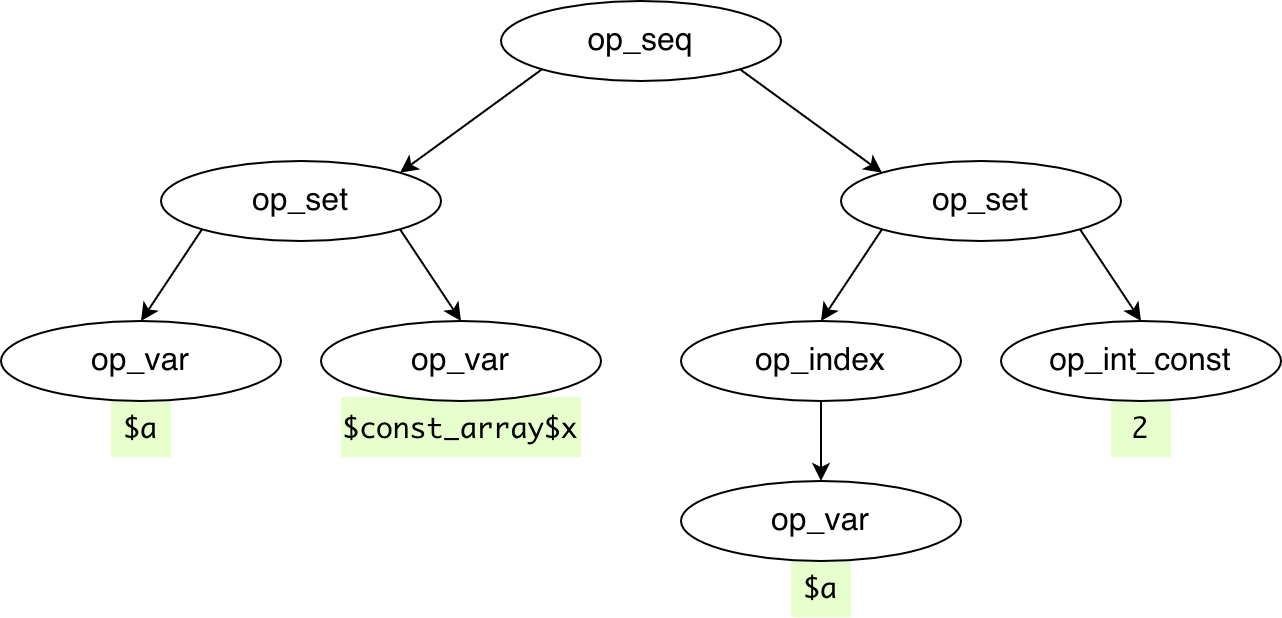
Call graph and functions binding
After all reachable code has been loaded and converted to AST representation, AST nodes are associated with real parsed functions by PreprocessFunctionPass:
- simple invocation some_function() binds to this function unless it's a generic function
- require_once “file.php” binds to “file wrapper” surrounded with the once condition
- new ClassName binds to constructor invocation
- array_map(‘funcname',…) and other string callbacks are resolved and bound
- lambdas invocations bind to anonymous __invoke() methods
- $a->f() (more generally, …->f()) is bound to method of the left-hand class
Pay attention to the last point! When we want to bind ...->f() to the concrete method, we need to know the type of expression on the left. We don't know it, but we can't start inferring types until the whole call graph is built:
function example($object) {
$object->f(); // can't detect type of $object, can't bind f() => compilation error
}
To overcome this, KPHP needs a hint — PHPDoc /** @param ClassName $object */ or type hint example(ClassName $object). Without this, instance type can't be detected.
This “instance detecting” is called “class assumptions” and implemented in class_assumptions.cpp. It contains a set of rules that work before inferring and detect instances on the left of arrows. Typically, if IDE can suggest properties/methods after an arrow, KPHP will resolve it too, and vice versa.
This topic is also discussed in the article about instances.
Control flow graph
Having a full call graph, a control flow graph is built. It analyzes language constructs (represented as AST, of course) and detects, what would be executed before, and what would be executed after. Its area of responsibility can give such information:
- having
f() && g(), at first f() is called, and then (maybe) g() - having
f() ? g() : h(), at first f() is called, and then either g() or h() - having
list(...) = f(), at first f() is called(), and then arguments are assigned in reversed order forbeginning is reachable from final '}', whereasifbeginning is not- from try body catch clause is reachable, whereas from if body else clause is not
- from case statement, other case and default are inaccessible
- code after exit() or return is inaccessible
- binary operation
$a + 2reads the variable, whereas binary operation$a = 2modifies - … and so on
Finally, this helps drop unreachable local code, split local variables, and use smartcasts.
Control flow is implemented in cfg.cpp and is quite complicated.
Type inferring
Almost every AST vertex has a type in terms of the KPHP type system.
For example, number 2 is int, and $a=$b=4.5 is float.
At first, an inferring graph is built. It consists of nodes and edges. Nodes are similar to AST vertices. Edges indicate how to “transfer” types from one node to another on change.
$a = 0;
$a += getResult();
Informally, we describe it so: $a is the same variable, it's int merging with the return type of getResult() (if getResult() returns string, for example, $a will be mixed).
More formally (though not fully correct):
- $a, 0, $a and getResult() invocation are nodes
- edge from 0 to $a
- bidirectional edge between $a and $a
- “$a += …” equals to “$a = $a + …“, edge from the right side to $a
- edge from getResult return type to getResult() invocation
Then, all types of constants are set: numbers/strings/etc. Others remain Unknown.
Next, there begins an inferring process. It is an iterative process while any type is changed.
Here we use edges to transfer types and hardcoded logic of how various AST vertices infer types from data and children. For example, we know, that $a + $b mixes the types, likewise [$a,$b] results in a generalized one-dimensional array of merged children types.
Edge from 0 to $a merges int with Unknown, resulting in int for both $a references. As far as getResult return type refines, it's transferred to invocation, changing $a + getResult(), maybe changing its type, transferring to $a, affecting something else by edges, and so on.
Type inferring is a convergent process. On every step, it generalizes types: from Unknown to int, from int to float, from float to mixed… But not vice versa: types can be generalized only in one direction, otherwise it can be endless. For instance, this is the reason why function overload can't exist, as long as the reason for template function existence, because they are based not on inferred, but on apriori information.
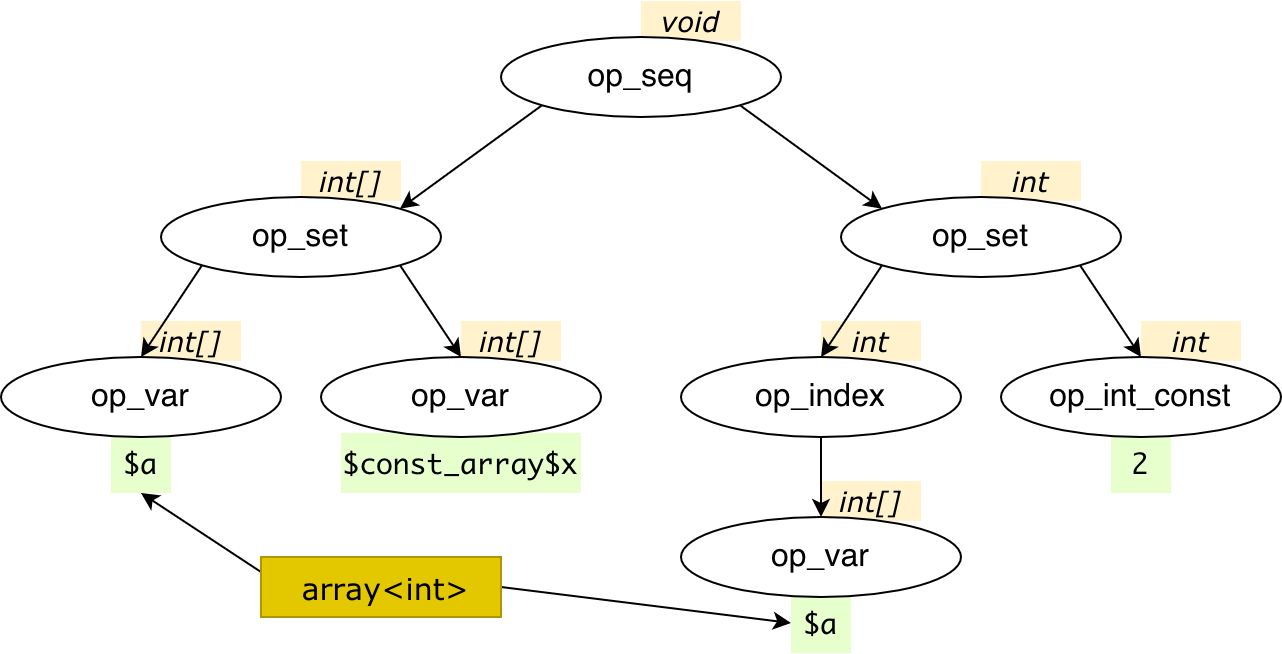
Optimizations and final checks
The next pipes are also dedicated to AST lookups and perform some operations having types in mind.
For example, FinalCheckPass analyzes, that: you don't index non-indexable types; you don't convert unconvertable types; you don't use operands which may differ from PHP.
Various optimizations are also performed with types. For example, removing redudant casts, pre-casting or replace $i++ with ++$i. $surely_array[] = ... is push_back() for example:
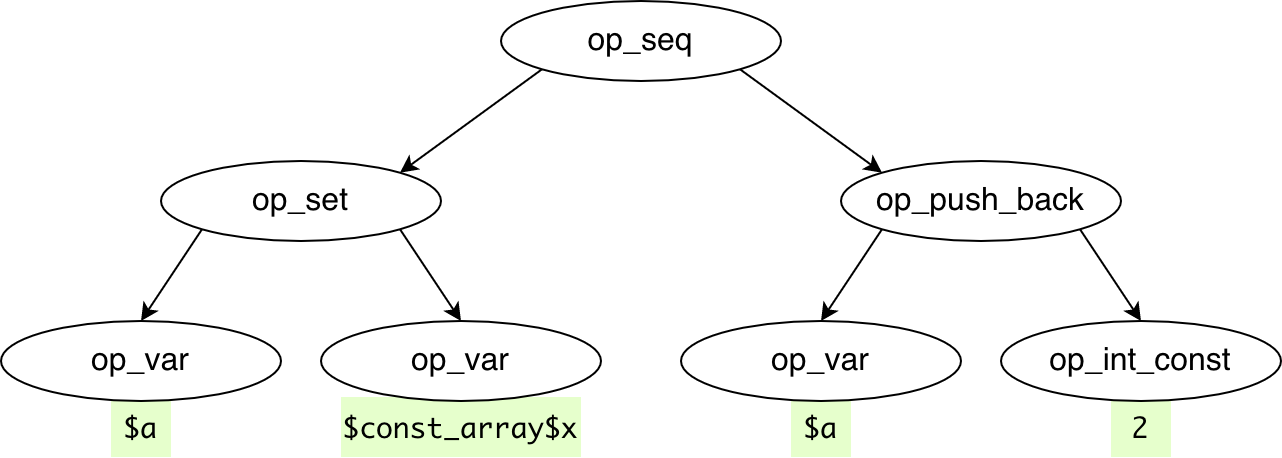
C++ code generation
Having final AST and types for a function, it can be converted to C++. It's either represented with .h and .cpp files or just .h file in case it's inlined.
Each PHP function is generated as a C++ function, each PHP class is generated as a C++ struct. Class methods aren't methods though, they are also functions, which accept $this as a parameter. All necessary #include and extern declarations are inserted, circular links are properly maintained. Every inferred type has a C++ analog.
PHP functions are generated with f$ prefix: PHP hello() → C++ f$hello. This avoids any potential conflicts in naming. PHP methods are generated to C++ functions with names like f${class}$${name}. To support late static binding (calling methods with static::name() PHP style with inheritance), this method is “duplicated” to every ancestor having a different context, which leads to functions named f${cur_class}$${name}$${context}.
PHP variables are prefixed with v$, class fields are prefixed with $.
Besides functions and classes, there are other codegenerated parts:
- global variables (static functions' variables and static class fields are also globals)
- constant arrays and strings
- possible storage types for resumable functions with reinterpret mapping
- RPC/TL classes
- … and more
Codegeneration is stable. It means, that if PHP code remains unchanged, the C++ code won't change too. Regardless of multithreading and not predefined execution order, all pipes, AST modifications, and implicit generation is implemented keeping stability in mind.
All in all, we started from the PHP snippet
$a = [1];
$a[] = \A::TWO;
And reached final codegenerated C++ code:
v$a = v$const_array$x;
v$a.push_back(2);
C++ compilation and linkage
KPHP invokes g++ only on files that had changed since the previous run: C++ compilation is incremental. Of course, all dependencies are analyzed: if a.h changed, and b.cpp includes a.h, it would be recompiled as well.
Each C++ file has //crc64 and //crc64_with_comments at the very beginning. Comparing these hashes with the previous codegeneration detects, what has been changed and thus needs to be rebuilt including all tree-up traversing dependencies.
Unless --no-make option is set, the compiling and linking process starts.
For every file that has to be recompiled, KPHP launches KPHP_CXX compiler (g++ by default) with KPHP_CXX_FLAGS. For really huge projects, nocc can be set up for parallel compilation.
To link resulting object files, KPHP_CXX is also executed unless KPHP_DYNAMIC_INCREMENTAL_LINKAGE is set.
See command-line options for more details.
After all is done, the resulting binary is produced. Typically, it is a web server, but optionally you can change it to CLI mode for example.
If KPHP_VERBOSIRY is greater than 1, a colored overall table is printed. It includes duration, memory usage, and handled objects for each pipe.
C++ codegeneration works pretty fast. For ~1M lines of code with ~20k functions, it takes just 4-5 seconds.
